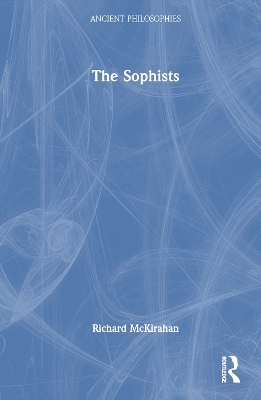
The Sophists
Seiten
2024
Routledge (Verlag)
978-1-138-90278-7 (ISBN)
Routledge (Verlag)
978-1-138-90278-7 (ISBN)
This book offers a new way of looking at the 5th century BCE Sophists, rejecting the bad reputation they have had since antiquity and presenting them as individuals rather than a “movement”, each with his own speciality and personality as revealed through the scant surviving evidence.
This book offers a new way of looking at the fifth-century BCE Sophists, rejecting the bad reputation they have had since antiquity and presenting them as individuals rather than a “movement,” each with his own specialty and personality as revealed through the scant surviving evidence.
It provides an account of the Sophists of this period that explains the historical and social developments that led to their prominence and popularity, demonstrating the reasons for their importance and for their seeming disappearance in the fourth century BCE. Restricted to discussion of the few Sophists for whom there are surviving quotations or other texts, The Sophists avoids generalizations often found in other books. It contains accurate translations of most of the surviving material, which forms the secure possible basis for understanding the Sophists as individuals in their various roles, not only as educators but also as ambassadors and pioneers in other fields. After a general introduction, the following chapters present each of the Sophists individually, followed by three chapters that present topics treated by more than one Sophist, such as Logos, Definition and the Nomos-Phusis contrast. The final three chapters reveal the way three important intellectuals of the fourth century (Plato, his rival Isocrates and Aristotle) dealt with the Sophists. An appendix contains several longer passages or works in their entirety in translation, allowing readers to have access to the original source materials and develop their own interpretations.
This thorough treatment of the fifth-century Sophists is of interest to scholars working on the subject and on ancient Greek philosophy more broadly, while also being accessible to undergraduate students and the general public interested in the topic.
This book offers a new way of looking at the fifth-century BCE Sophists, rejecting the bad reputation they have had since antiquity and presenting them as individuals rather than a “movement,” each with his own specialty and personality as revealed through the scant surviving evidence.
It provides an account of the Sophists of this period that explains the historical and social developments that led to their prominence and popularity, demonstrating the reasons for their importance and for their seeming disappearance in the fourth century BCE. Restricted to discussion of the few Sophists for whom there are surviving quotations or other texts, The Sophists avoids generalizations often found in other books. It contains accurate translations of most of the surviving material, which forms the secure possible basis for understanding the Sophists as individuals in their various roles, not only as educators but also as ambassadors and pioneers in other fields. After a general introduction, the following chapters present each of the Sophists individually, followed by three chapters that present topics treated by more than one Sophist, such as Logos, Definition and the Nomos-Phusis contrast. The final three chapters reveal the way three important intellectuals of the fourth century (Plato, his rival Isocrates and Aristotle) dealt with the Sophists. An appendix contains several longer passages or works in their entirety in translation, allowing readers to have access to the original source materials and develop their own interpretations.
This thorough treatment of the fifth-century Sophists is of interest to scholars working on the subject and on ancient Greek philosophy more broadly, while also being accessible to undergraduate students and the general public interested in the topic.
Richard McKirahan is the Edwin Clarence Norton Professor of Classics and Professor of Philosophy at Pomona College, Claremont, California, United States of America and a Visiting Professor of Philosophy at the University of California, Santa Barbara.
1. Introduction; 2. Protagoras of Abdera; 3. Gorgias; 4. Antiphon of Rhamnous; 5. Hippias of Elis; 6. Prodicus of Ceos; 7. Thrasymachus of Chalcedon; 8. Euthydemus and Dionysodorus of Chalcedon; 9. Logos; 10. Definition; 11. Antilogic; 12. Nomos and phusis; 13. Isocrates; 14. Plato’s complicated relationship with the Sophists; 15. Aristotle and the Sophists; Appendix: Texts relating to the Sophists
| Erscheinungsdatum | 30.08.2024 |
|---|---|
| Reihe/Serie | Ancient Philosophies |
| Zusatzinfo | 2 Line drawings, black and white; 2 Illustrations, black and white |
| Verlagsort | London |
| Sprache | englisch |
| Maße | 156 x 234 mm |
| Gewicht | 566 g |
| Themenwelt | Geschichte ► Allgemeine Geschichte ► Vor- und Frühgeschichte |
| Geschichte ► Allgemeine Geschichte ► Altertum / Antike | |
| ISBN-10 | 1-138-90278-0 / 1138902780 |
| ISBN-13 | 978-1-138-90278-7 / 9781138902787 |
| Zustand | Neuware |
| Informationen gemäß Produktsicherheitsverordnung (GPSR) | |
| Haben Sie eine Frage zum Produkt? |
Mehr entdecken
aus dem Bereich
aus dem Bereich
Was Pompeji über uns erzählt
Buch | Hardcover (2023)
Propyläen (Verlag)
CHF 44,75
auf den Spuren der frühen Zivilisationen
Buch | Hardcover (2023)
C.H.Beck (Verlag)
CHF 27,95


